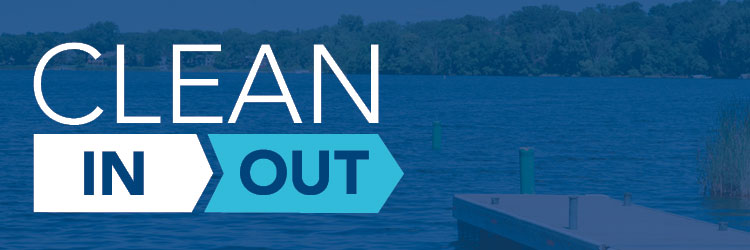Clean In, Clean Out

Together, we can stop the spread of invasive species.
Aquatic invasive species (AIS) such as zebra mussels threaten the health of Minnesota's beloved lakes. They are often unknowingly transported from one lake to another when they hitch a ride on our watercraft, trailers and aquatic sports equipment.
They're harmful and damaging, which is why it's important that we all do our part to prevent their spread to other lakes, rivers and streams. All it takes is a few minutes to ensure your equipment is clean before you put it in the water and when you take it out. Clean in, clean out.
Clean your watercraft
Use this free web app to guide you through a quick and complete check of your watercraft. You'll also find some cleaning tools at our boat launches to help you do the job.
AIS tool stations
AIS tool stations provide basic tools such as brushes or pickers to remove mud, weeds and debris from your equipment and trailers. Tool stations can be found at all Ramsey County Parks & Recreation boat launch areas.
CD3 cleaning machine
Turtle Lake County Park offers a CD3 (Clean, Drain, Dry and Dispose) cleaning system that's free to use. The unit provides a variety of self-service resources including an air blower, wet-dry vacuum, hand tools and lights to help you remove, then dispose of, water, weeds, debris and leftover bait.
What are invasive species?
Invasive species are non-native plants or animals accidentally introduced into land or water by people. Because natural predators do not exist to keep their populations in check, they can quickly throw ecosystems out of balance by overwhelming and destroying native species. In addition, they can cause recreational and economic damage, potentially changing the ways in which we'll be able to use and enjoy Minnesota waters.
Did you know?
Many invasive species are difficult to detect in certain phases of their life cycles, which is why it's important to clean, drain and dry boats and trailers.
- Zebra mussels in the larval stage are microscopic. Even a drop of water can harbor countless zebra mussels.
- Just one adult female zebra mussel can produce 30,000 to 40,000 eggs in each reproductive cycle, and over one million each year.
- Adult zebra mussels can tolerate a wide range of environmental conditions — even surviving out of water for about seven days.
Zebra mussels
Although small, zebra mussels can cause big trouble.
- Damage boat motors and hulls, reducing performance and efficiency that is costly to clean and repair.
- Pose a risk for swimmers and pets to cut their feet on sharp zebra mussels that are attached to rocks, docks, swim rafts and ladders.
- Create an expensive problem for power plants, cities and residents when they clog water intakes.
- Filter tiny food particles out of the water, reducing food available for larval fish and other animals.
- Attach to and kill native mussels.